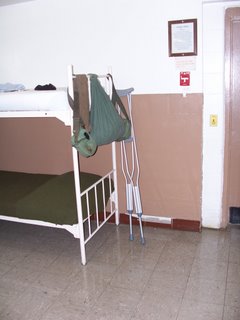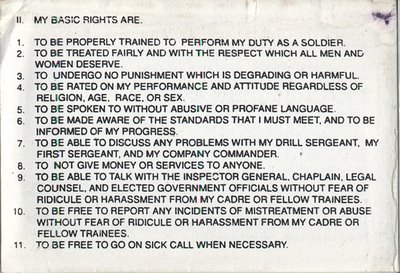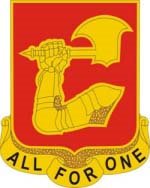Fort Benning Trainee "Double Timing" on Broken Leg

Apparently Fort Benning is not satisfied to leave Fort Sill resting on its laurels as the most documented location of abuse of injured Army trainees. The competition is heating up, so to speak. Sadly, as is common, the trainee in the following story has expressed that others are being treated worse than him. A young man who dreamed of nothing all his life except being a soldier is a trainee at Fort Benning. He seriously fractured his leg during Basic Training, and as a result is in a cast and on crutches.
He has been informed that he is receiving a medical discharge (known as a "Med Board"). The Army has up to 90 days to effect this, once the decision has been made. Despite the obvious evidence of this Private's injury, his officers and NCOs have decided to have a little fun with him. I guess there's no appropriate place for this young man to be while he waits out his unwanted medical discharge, because they have him sitting in a training battalion headquarters building with those his senior (which is nearly everyone when you are a trainee Private). [Note: This Trainee's particular Training Drill Sergeant is NOT a participant in the following incidents]
Outside of the miscellaneous insults he receives on a daily basis, the following are incidents of verbal and secondary physical ABUSE:
- An OFFICER of the training unit required the trainee to look up and read the definition of "infirm" out loud and then informed the trainee, "that is you, you are the weak, the helpless, the useless." Small stuff, you might think. Now remember that the Officers set the tone for those under their command and read on.
- A DRILL SERGEANT took the trainee's crutch away from him and threw it in the bushes. As a note, the trainee then tried to get permission from the medical staff to forego his crutch. That permission was refused.
- Another DRILL SERGEANT made the trainee DOUBLE TIME around the building on his broken leg. (Double time "begins with the left foot, raises the forearms to a horizontal position along the waistline, cups the hands with the knuckles out, and begins an easy run of 180 steps per minute with 30-inch steps, measured from heel to heel. Coordinated motion of the arms are maintained throughout")
- Yet another DRILL SERGEANT has ordered the trainee to recite the following [Note: as of this time, the trainee has refused to do it, and has recited the Soldiers' Creed instead]
I am an American Profile.
I am weakly, and a burden to the team.
I serve the hospital and the people who work in it.
I will always be the first to complain about the mission.
I will easily accept defeat.
I will always quit.
I will be the fallen comrade.
I am always hurt, physically, and/or mentally.
Trained and proficient in filling out the sick call slip,
I will always complain about my arms, my legs, and anything else wrong with me.
I am on crutches and I am on quarters.
I sit, ready to duck, dodge, and avoid the PT test conducted by the Army of the United States
of America.
I am a guardian of the clinic and a sorry way of life.
I am an American profile.***
Very clever, don't you think? Not quite on the level with Weird Al Yankovic, but considering the source, not a bad parody to use on an injured trainee who is already grappling with the apparent destruction of his lifelong dream. Causing physical pain and mental anguish to this young Private is justified, right? After all, he became injured in an attempt to serve his country, and that makes him useless, right? He should be out there running on a broken leg, right? Oh, but wait, HE ALREADY DID THAT.
I have cut and pasted both the public comments made by his family member elsewhere on this blog, and excerpts from her private comments to me (with her permission) below the actual Soldiers Creed.
***[The "Real"] Soldiers Creed
I am an American Soldier.
I am a Warrior and a member of a team.
I serve the people of the United States, and live the Army Values.
I will always place the mission first.
I will never accept defeat.
I will never quit.
I will never leave a fallen comrade.
I am disciplined, physically and mentally tough, trained and proficient in my warrior tasks
and drills.
I always maintain my arms, my equipment and myself.
I am an expert and I am a professional.
I stand ready to deploy, engage, and destroy, the enemies of the United States of America in
close combat.
I am a guardian of freedom and the American way of life.
I am an American Soldier.
Injured Trainee's Family Member Comments:
"I must say that had I read this a few months ago I would not have believed it. Now I know first hand. I have a son in the Army in basic at Benning and he is not being treated very well.
Until his injury we were receiving very upbeat letters from him talking about how he loved the Army and how excited he was, he told us basic was hard but he was doing very well. About six weeks in he was injured and he called us to tell us they are discharging him under a medical discharge. That was three weeks ago. The letters we get now tell us that he sits in the HQ all day for 12 hours and more, staring at the wall, he mentioned that he is called names. He told us that his own DS and his company treat him with respect but others do not. The injured are ridiculed often and are all treated like quitters.
It is interesting that they label him a quitter even though he marched on a fractured leg without complaint and then broke it the next morning while running.
Today's letter told us that a Cpt there made him look up the word "infirm" and tell him the definition of the word and then informed him that "this is you, weak, feeble and useless".
It scares me, he has only mentioned these things in passing, most of his letters are just his despair at being sent home and his despair at watching the others go out and train while he sits and waits.
I am angry over this treatment. I am a veteran and come from a family of veterans. I have taught my children patriotism and was proud when he chose to serve his country and proud of the letters I was receiving talking of his commitment to the Army and his desire to make a career of it and that he felt he had found a home, now I am ashamed that he is being treated like this. In my opinion there is nothing more precious that we can offer our country than our brave sons and daughters and for them to be treated in this manner is deplorable.
Reading this blog makes me even more concerned because it was my hope that he is simply facing a couple of people with no honor who are just being cruel, yet from reading this it seems it is common and I worry for his mental state if he has to stay in these conditions for very long. "
"He was part of the Young Marines program as a child and had trained in numerous martial arts programs all in preperation to become a soldier. He rarely talked about anything else growing up.
We received many letters, in them he spoke of his pride at being a soldier, he said the training was hard but he loved it, and how he believed he belonged in the Army. He was training to be an Infantryman. He spoke in letters of how he would most likely end up in Afghanatstein or Iraq and that we must not worry for him, that he was proud to go and serve, that it was his duty to do so.
And then he was injured.
On a ruck march he hurt his leg, he said he pushed himself and finished the march, his leg was bothering him but he was working through the pain. The next morning he went out to do PT and while running the bone fractured. The docters told him they think he fractured it the previous day on the march and fractured it worse when he attempted to run on it the next day.
Since that time, my son has been treated like a piece of garbage. He is called names which I cannot mention in an email to a stranger. He says that his own drill sergeant and his company do not mistreat him, they have told him he is a soldier at heart and they are sorry to see him injured.
He is being discharged. He found out about the discharge on (recent date deleted) of this year. He is still at the (designation deleted) at Benning, he has to sit at their HQ every day and endure insults by both officers and NCO's. As his mother I made the mistake of sending an email to the commander of the (designation removed) and I got a very respectful reply back, but I found out today that this man asked my son to look up the word "infirm" and read him the definition and then he told my son "that is you, you are the weak, the helpless, the useless".
My son is very depressed and told me today that he is trying to endure, but it is very hard, he does nothing all day except sit and stare at the wall. He does this for 12 hours or more every day, and it is only broken up by the moments when NCO's and Officers come in and give him verbal abuse and insult him. And even through all this all he really wants is to be able to stay in the Army and finish his traning and become and Infantryman. He is not a quitter and can take a lot of abuse but this mental abuse is horrible and I fear they will break him."
"All of them talk about his sitting around all day with nothing to do. He is not allowed to read or rest while the rest of the group are out training so he sits. Two letters make reference to the two persons who call him "broken dick" and the officer that made him look up the definition of "infirm". There are others there getting worse treatment. My son has it easy so to speak because he has the respect of his drill sgt and his group, some of the young men there have no one. I cannot imagine the torment of the ones who just are not able to make the stress of basic training or the ones whose injuries are not readily visible. My son is in a cast and on crutches so at least he has something visible to look at showing he is injured."
"He said one of his DS's told him that out of all the guys in the company that (name deleted) is the one he would not be afraid to go into battle with on day one. He said that made him proud.""He says he is reading his Bible and praying and that doing that plus having the support of his company and his own drill sgt as well as the first sgt enables him to get through the days where the others are messing with him all the time. He is going to church each Sunday and he is speaking with a Chaplain when everything starts to get more than he can bear."
Labels: army injury, basic training, Fort Benning, medical discharge, soldier's creed, trainee abuse









 Help Skippy!
Help Skippy!



